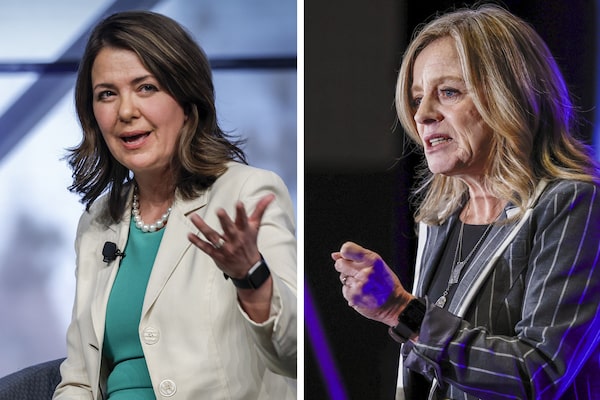
UCP leader Danielle Smith, left, speaks at an economic forum in Calgary on April 18. NDP leader Rachel Notley addresses the Calgary Chamber of Commerce on Dec. 15, 2022.Jeff McIntosh/The Canadian Press
Duane Bratt is a political science professor and chair, department of economics, justice and policy studies, at Mount Royal University in Calgary.
Alberta has been on the oil and gas roller coaster for at least 50 years. It keeps repeating the same promises to do something different, but continues to contradict those promises with the same policies. The May 29 provincial election is proving once again that Alberta’s fiscal framework will continue to be based on the fluctuations of global oil and gas prices.
When times are good, like they are now, parties bring in tax cuts. United Conservative Party Leader Danielle Smith has made her first major campaign promise – if re-elected she would bring in a $1-billion tax cut by reducing the rate to 8 per cent from 10 per cent on the first $60,000. She also promised to extend the fuel tax holiday (13 cents a litre) throughout 2023. This has been consistent with past practice. Former premier Ralph Klein brought in a flat tax in 2001 as provincial coffers filled with natural gas royalty revenue.
Likewise, when oil and/or gas prices are high, spending increases. Ms. Smith’s February pre-election budget was the largest spending budget in Alberta’s history, with billions in new money flowing into health care and education. This replicated similar investments by Peter Lougheed in the 1970s and by Mr. Klein in the early 2000s.
Beyond tax cuts and spending increases, some governments even write direct cheques to Albertans. In 2006, Mr. Klein famously issued $400 “Ralphbucks” to every Albertan. In the spring of 2023, Ms. Smith delivered $600 in affordability cheques to parents and seniors.
However, when the fiscal roller coaster goes in its inevitable downward slide, parties do not respond in a corresponding manner. There may be some tax increases. There may be some spending cuts, most notably with Mr. Klein’s “massive cuts” in 1994. But, in general, successive governments (Conservative and NDP) avoid making the tough decisions and rely on budget deficits, hoping that eventually the fiscal roller coaster starts to go back up.
One thing that governments refuse to do when times are good is put money into the Alberta Heritage Savings Trust Fund.
Mr. Lougheed created the fund in 1976 to save non-renewable resource revenue for a future when money did not flow in from oil and gas. In the initial years, 30 per cent of resource royalties were put in the fund, but it dropped to 15 per cent in 1983, and by 1987 it was 0 per cent.
Now, whether times are good or bad, no new money is invested in the heritage fund. Even the interest is drained from the fund and put into general revenue. There are some one-off exceptions, such as 2005-08, when several billion dollars were reinvested. But this has been rare. This is why the current value of the fund is $18-billion, a growth of only about $6-billion since the early 1980s.
The lack of investment in the heritage fund has been a source of complaint by many critics. Norway, with its trillion dollar fund, is often invoked. Sometimes parties even make serious policy announcements that, sometime in the future, they will allocate a certain percentage of resource revenue into the heritage fund. Both the UCP and the NDP have made the same promise for the 2023 election.
Yet it does not happen and likely will not happen.
It is not because Alberta governments are led by idiots. However, its leaders are responding to other incentives. Those incentives are provided by voters.
Alberta voters may complain that their government does not have a long-term priority by saving non-renewable resource revenue, but what they really want are the immediate benefits of lower taxes and high social spending. The Alberta Advantage!
The only way that Albertans can have both lower taxes and high social spending is by spending royalty money on a yearly basis. University of Calgary economist Trevor Tombe estimates that more than 20 per cent of Alberta’s budget currently comes from non-renewable resource royalties. When former premier Jim Prentice said Albertans needed to “look in the mirror,” he was widely condemned and ultimately lost his job.
So Alberta governments have been giving Albertans what they want for more than 50 years. A reckoning will eventually come and the fiscal roller coaster will go permanently down. However, as the 2023 election campaign shows, neither Ms. Smith nor NDP rival Rachel Notley believe that this reckoning will come anytime soon.